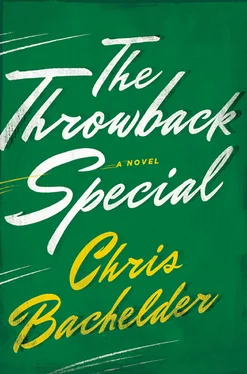Steven stood at the window, listening to the dark rain. Any weather, when sustained, begins to feel like an interrogation technique. He needed to call the front desk to report the theft of the lottery drum. He needed to tell Randy that Donnie Warren’s wrists are wrapped in tape. It looks like wristbands, but it’s not. It’s tape. Was Jeff still talking about marriage? Was he still yammering with his stupid face about squirrels digging up the mulch? Steven didn’t care at all about anything Jeff said. Steven would rather hash things out with George than endure another speech from Jeff about human relationships. For some reason he found the mention of astronomy particularly infuriating. He checked his phone for pictures or news from the school play, but there was nothing. He was, of course, still glad he had come. He could not have not come.
Randy lay on the bed, flipping through a woodworking catalogue. He disliked Jeff, but not strongly, so he was free to ignore him. Derek lay beside Randy, bored and restless. He was not listening to Jeff. What if, Derek had been wondering, the offense just didn’t run the Throwback Special? What if they drew up another play in the dirt? What if they broke the huddle and then surprised the defense with some other play? They could change the snap, even go with a silent count. Why had this never occurred to him before? Was it crazy? Steven would never go along with it. Randy would. It was an insidious thought, and drunken. A draw is particularly effective against aggressive linebackers, Derek considered. Or a screen.
ADAM STOOD LOOKING out the window of Room 212 like a homesteader during an April blizzard. The defensive backs, and particularly the safeties, were the least prominent of the players. They backpedaled from tragedy, like inverse first responders. Their job was essential, but remote and untelevised. This feeling, of being important but unrecognized, distant from the hub, was all too familiar to most of the men. The long-standing notion was that the defensive backs’ room was the party room—“Vegas”—but the truth was that the room typically had a sour mood and an early bedtime.
“If you work in the automotive industry, you have to be thinking about the end of cars,” Adam said, still facing the window. “If you work in phones, you have to be preparing for the day when people don’t use phones anymore. If you work in laptops, you spend your days imagining what comes after laptops. Everything thriving is dying. Every industry has become the fashion industry. The car is dead, the book is dead, the PC is dead. My office is paperless. Potatoes are somehow bad for you. People don’t want to live in houses anymore. It’s exhausting.”
“Why were you so late, Adam?” Peter said.
“It was a domestic situation,” Adam said.
“What isn’t?” Peter said.
“It was a family emergency,” Adam said.
“You got that right,” Peter said.
The heating and cooling unit ticked and clanked. Chad sat in the orange chair, looking at his phone. His feet, in socks, were wet and cold. He felt that the cold, wet socks were emblematic of his folly and weakness. His throat burned from the cigarette he had bummed off that gray-faced marketer from Prestige Vista Solutions. He wished he had not smoked that cigarette. And it had been foolish to throw his shoes in the dumpster, he now realized. The only other shoes he had were his cleats. At the time he had thrown his shoes in the dumpster he had felt a rush of defiance, but whom, exactly, had he defied? He liked the shoes, or had at one time, and so he had apparently defied only himself. He had spited his face. He had hoisted himself. His wife hated the shoes, and though she had not demanded or even suggested (nor would she, ever) that he discard the shoes, in discarding them he was, he now felt, executing remotely her unspoken wish. That the actualization of his wife’s desire had felt, out in the rain by the hotel dumpster, so authentically like the actualization of his own desire, meant either that they were soul mates, or that he lived under a totalitarian regime. How was it that he could not, here in his cold, wet socks, make any meaningful distinction between compliance and defiance, or ascertain to whom he had stuck it, if indeed he had stuck it to someone? It was true, however, that his wife was frugal, and she would no doubt object to his throwing away perfectly functional (though detestable) shoes, and so in this way perhaps the act was defiant in its profligacy, like the Boston Tea Party. He would teach her a lesson. He would show her not to not like his things. But that was not what he wanted! He wanted her to like his things, which meant that inevitably she would not like some things. He cared about what she thought. If your defiance reveals vulnerability, not strength, it’s really not very effective defiance. Chad’s original embarrassment about buying the shoes was now compounded by the embarrassment about throwing them away. He had acted like a maniac, and now he wanted his shoes. A genuinely defiant act, he realized, would be to retrieve the shoes from the wet dumpster. That would be a bold expression of his life force. He could dry them with the hair dryer attached to the wall in the hotel bathroom. But what about Andy and Nate? They had thrown their shoes in the dumpster, too, in a spirit of inebriated and defiant camaraderie, and as an expression of their individual wills. They had all thrown their shoes away, together, instead of smoking a cigarette, but then the guy from Prestige Vista Solutions shuffled out of the side exit with a full pack, and they had all smoked a cigarette anyway, even though they had all quit. Chad hated himself . If he pulled his shoes out of the dumpster, Nate and Andy would no doubt see the shoes tomorrow, and they would consider the recovery a sign of weakness, not strength — a kind of capitulation to the overwhelming forces of (feminized) convention, a disavowal of their defiant ritual in the rain. Chad was trapped between two incommensurable systems of meaning. Sifting through the cold and soaking trash of the hotel dumpster would be both noble and craven, depending upon the interpretive community. “Fun here,” Chad texted to his wife. “Luv u.” Charles, who was either a psychologist or a psychiatrist, was here, in this room, and perhaps he could be of help to Chad, but he was at the moment occupied by Peter, who was troubled by a recent incident in the home.
(Chad had missed some of the story, but it seems that Peter had been roasting marshmallows by himself with his gas stove in the middle of the night when his seven-year-old son entered the kitchen and witnessed the scene. I thought I smelled something, the child had said, staring at Peter warily, refusing to return to bed. Peter just stood there with two perfectly golden marshmallows on the end of a barbecue fork. Big deal, Adam said, still staring out the window. Continue, Charles said. He had the look of one betrayed, Peter said. I think he had a hard time with it, with the idea that this person he loved and trusted could roast marshmallows while he slept. It’s been a couple of weeks, and he’s had trouble falling asleep. He’s wet the bed a couple of times. I shouldn’t have done it, I guess, Peter said. It wasn’t a dessert night. A phone vibrated in a duffel bag . I’m glad you’re here, Charles. Charles, I’m glad you’re here . Chad waited in his wet socks, and the waiting felt emblematic.)
“WHERE’S ANDY?” Gil said in the offensive linemen’s room.
“Probably out smoking,” Trent said.
“No, he quit,” Gil said.
“I could smell it on him earlier,” Trent said.
Trent was lying on his back in bed. The laptop quivered on his stomach like a dog on a roof. Gil stood in front of the television, flipping rapidly through channels.
Читать дальше












